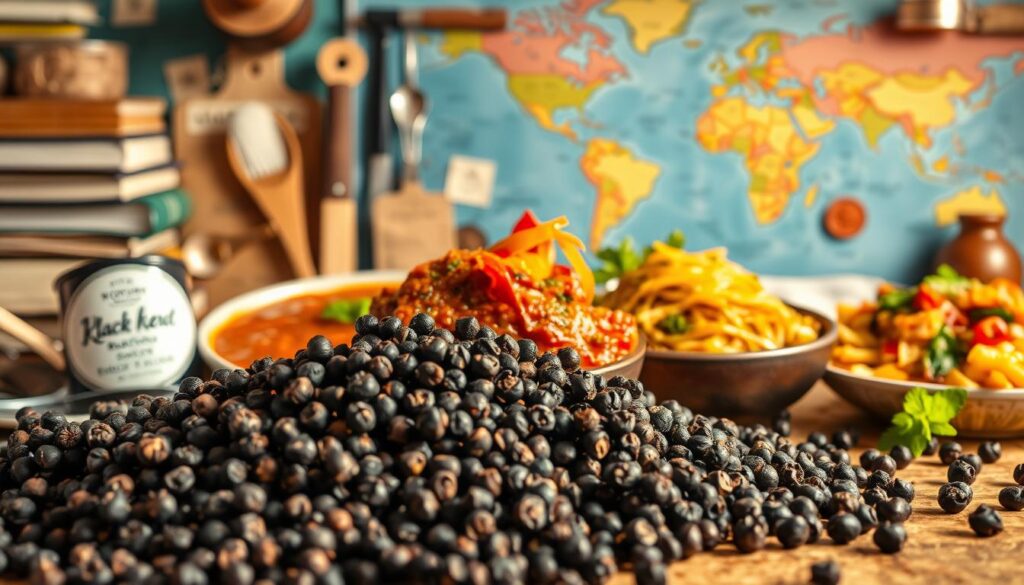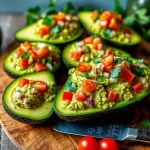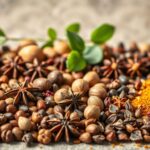We’re excited to share the story of the world’s most traded spice! As home cooks, we know how much a right spice can change a dish. If you’re looking for inspiration, check out the best cookbooks on Amazon, including the top 10 cookbook with spice-filled recipes. The right spice can make any food and wine experience better.
Did you know peppercorn is the most traded spice in the world? It makes up a big part of the $3.88 billion in spice exports in 2023. This spice is a must-have in many kitchens, showing its global importance. Whether you love food and wine or are just starting to cook, you’ll find peppercorn’s history and uses fascinating. So, let’s dive into the story of this versatile and flavorful ingredient, perfect for anyone who loves cooking and trying new recipes.
As we explore spices, we’ll show you how to use peppercorn in your cooking. We’ll cover simple recipes to more complex dishes. We’ll also share tips from professional chefs and give you the confidence to cook at home. So, stay tuned and get ready to improve your cooking with this amazing ingredient, perfect for any food and wine lover.
The Ancient Legacy of Black Pepper in Global Trade
Black pepper has been a prized spice since ancient times. It was known and loved in ancient Greece and Rome. The need for black pepper and other spices like cinnamon and myrrh created trade routes. These routes included the Silk Road and sea paths.
This history has influenced how we cook today. Black pepper is a key ingredient in many recipes. It’s also important in budget cooking and diets & weight loss plans.
The spice trade greatly affected ancient societies. Spices were seen as symbols of wealth and status. The mixing of spices in European cooking started fusion cuisine, which still grows today.
Learning about ancient spice routes and black pepper’s role in history shows spices’ importance. They shape our cooking and diets & weight loss efforts.
- Evidence of spices like cinnamon and myrrh found in Egyptian tombs as early as 2000 BCE
- The overland Silk Road served as a trade route for spices linking East to West
- Black pepper was often used as a form of currency and was valued as highly as precious metals
The spice trade played a big role in global economics and cultures. It has shaped our cooking, including quick & easy and budget cooking. It also influences our diets & weight loss strategies.
Why Black Pepper Dominates Modern Spices and Herbs Markets
Black pepper is the most traded spice globally, with a rich history and ongoing demand. It’s a key ingredient in comfort food cooking. Its versatility and unmatched flavor and aroma make it popular.
In culinary arts & techniques, black pepper is a must-have. Celebrity & TV show cookbooks often highlight its importance. It adds depth and warmth to any dish, making it essential for cooks of all levels.
Black pepper’s popularity isn’t just about taste. It also holds cultural significance. In ancient times, it was as valuable as a horse or a sheep. Today, the black pepper market is growing fast, with a 7% CAGR from 2023 to 2033. The global market value is US$ 5,406.0 million in 2023.
Looking ahead, black pepper will remain a key player in the spice world. Its versatility, flavor, and cultural importance make it a staple in kitchens everywhere. Whether you’re a pro chef or a beginner, black pepper is a must-have.
From Vine to Table: Black Pepper Cultivation
Exploring black pepper’s world is exciting. It’s great for both seasoned cooks and beginners. Black pepper grows in many places, like Vietnam, Brazil, and Indonesia. It’s a key spice in many dishes around the world.
Let’s dive into how black pepper is grown. From planting to harvesting and processing, it’s a journey. We’ll see how to get top-notch black pepper and use it in cooking.
Some big places for growing black pepper are:
- Vietnam, which makes about one-third of the world’s pepper
- Brazil, a big producer of black pepper
- Indonesia, known for its long black pepper history
Knowing how black pepper is grown helps us value this spice. Using quality black pepper can really enhance your cooking. It makes your dishes taste and smell better.
Understanding Different Types of Black Pepper
Exploring black pepper reveals many types, each with its own taste and smell. In professional cooking, the right black pepper can make dishes stand out. For example, Black Tellicherry Peppercorns are prized for their rich and complex flavor.
Choosing the right black pepper can change a dish’s flavor. Black Malabar Peppercorns are common and often used at home. Black Lampong Peppercorns, on the other hand, are smaller and spicier because they’re picked earlier. To find out more about wine pairings for these peppercorns, visit this website.
Some well-known black pepper types include:
- Black Tellicherry Peppercorns
- Black Malabar Peppercorns
- Black Lampong Peppercorns
In summary, knowing about different black peppers can elevate your cooking. Whether you’re a pro chef or a home cook, trying various black peppers can enrich your dishes.
The Science Behind Black Pepper’s Distinctive Flavor
Exploring baking foods and culinary arts & techniques, we find black pepper’s unique taste fascinating. The flavor and aroma come from piperine, a chemical compound. Knowing this can improve your cooking, whether you’re experienced or just starting.
Black pepper is more than just a spice; it has a rich history. Its chemical makeup changes during processing, affecting its taste. Learn more about black pepper’s chemistry and how it boosts various dishes.
Quality ingredients are key in culinary arts & techniques. Freshly ground black pepper can greatly enhance your dishes. Try different peppers like Tellicherry or Lampong for unique flavors. Start with this guide on baking treats.
When using black pepper, consider these factors:
* The size and quality of the peppercorns
* The grinding process and its impact on flavor release
* The storage conditions to preserve the flavor and aroma
By understanding these, you’ll master using black pepper in your baking and cooking.
Essential Culinary Applications in Global Cuisines
Exploring the world of cooking, we see black pepper’s big role in many dishes. It makes flavors pop and adds depth to food. Whether you cook at home or in a restaurant, black pepper is key.
In global cooking, black pepper mixes with other spices for unique tastes. In Mediterranean dishes, it teams up with oregano, thyme, and rosemary. In Asian cooking, it’s with ginger, garlic, and soy sauce for stir-fries and noodles.
Some famous dishes with black pepper include:
- Indian curries, where it’s mixed with turmeric, cumin, and coriander for a rich taste.
- Chinese stir-fries, combining with soy sauce, ginger, and garlic for veggies and meat.
- Italian pasta, blending with parmesan cheese, basil, and olive oil for a tasty sauce.

As we keep exploring, we’ll find more uses for black pepper. We’ll enjoy the rich tastes and smells of food from around the world.
Health Benefits and Traditional Medicine Uses
Black pepper is packed with health benefits and has been used in traditional medicine for ages. It helps with diets & weight loss and makes comfort food taste better. Even famous chefs and TV shows love using black pepper in their recipes.
Black pepper boosts how well our body absorbs nutrients. This is super helpful when you mix it with other spices and herbs. For instance, it makes turmeric’s benefits stronger. This makes black pepper a must-have for both tasty meals and healthy eating.
Some of the key health benefits of black pepper include:
- Digestive health properties: Black pepper aids digestion and eases IBS symptoms.
- Anti-inflammatory effects: It has piperine, which fights pain and inflammation.
- Bioavailability enhancement: Black pepper boosts the absorption of other nutrients.
Black pepper is great for improving health and adding flavor to your food. Its many benefits and long history in cooking make it a valuable spice. So, next time you cook, remember to add black pepper for its amazing benefits!
Selecting and Storing Black Pepper for Maximum Flavor
Food & wine lovers know the importance of quick & easy cooking. Black pepper is a key ingredient in many dishes. Choosing the right type can really enhance your meals, whether you’re on a budget or splurging on spices.
Whole peppercorns can last 3 to 4 years if stored right. Ground black pepper, though, should be used within 2 years for the best taste. Keep it in a cool, dry spot, away from sunlight and moisture.
To store black pepper well, use an airtight container like a glass jar with a silicone seal. Store it in a dark place. You can also use Mylar bags for whole peppercorns to keep them fresh for up to 10 years. These tips will help you enjoy your black pepper’s full flavor for years.
The type of black pepper you pick can change your dish’s flavor. Tellicherry peppercorns offer a sweet, balanced taste with complex aromas. New World peppercorns, on the other hand, have a bold intensity and pungent bite. Try different types to find the perfect match for your cooking and taste preferences.
Professional Chef Tips for Black Pepper Usage
As we finish our look at black pepper, let’s learn from top chefs. They say the key to great flavor is in the grind size and when you add it.
For the best taste, chefs grind whole black peppercorns right before they season. The finer the grind, the better the flavor spreads. Coarse grind gives big flavor bursts, while table-ground adds a smooth heat.
When cooking, chefs add black pepper just before serving. This keeps the spice’s oils fresh and the flavor strong. For sauces, they add it earlier to mix the flavors well.
Whether you cook at home or professionally, learning about black pepper can make your food taste amazing. With a good grinder and some practice, you can season like a pro.
Source Links
- https://www.worldstopexports.com/top-exported-spices-by-sales-weight-and-unit-value/
- https://en.wikipedia.org/wiki/Spice_trade
- https://finance.yahoo.com/news/top-25-spice-producing-countries-070939081.html
- https://downtonabbeycooks.com/the-spice-trade-how-exotic-flavors-shaped-the-modern-world/
- https://www.pureleven.com/rich-history-of-indian-spice-trade/?srsltid=AfmBOop9Zy5H7fdrd5eg7fUx3UwHzzXvOobdjRINr_IaWnQyWMuixcoJ
- https://www.mccormickscienceinstitute.com/resources/history-of-spices
- https://www.persistencemarketresearch.com/market-research/black-pepper-market.asp
- https://ranchomastatal.com/blognewsletter/2020/6/30/life-of-spice-pepper
- https://en.wikipedia.org/wiki/Black_pepper
- https://www.savoryspiceshop.com/blogs/news/behind-the-seasoning-black-pepper?srsltid=AfmBOoq3ED0UbmOaYdD4ZBXmzmqmJg-Hwcy7coESUOjZk9C4ceAlP5Wq
- https://www.savoryspiceshop.com/blogs/news/behind-the-seasoning-black-pepper?srsltid=AfmBOoo1Demossrk9xbrMOsiXXPtLs0U5ByG-SbfyeClXUYn5yxJgnRU
- https://www.seriouseats.com/guide-to-pepper-varieties
- https://amazingribs.com/bbq-grilling-technique-and-science/ingredients-and-glossaries/science-peppercorns/
- https://www.holar.com.tw/blog/why-freshly-ground-pepper-tastes-better-the-science-behind-it/
- https://hospitalityinsights.ehl.edu/cooking-essential-culinary-herbs
- https://pmc.ncbi.nlm.nih.gov/articles/PMC4227268/
- https://girlcooksworld.com/the-essential-herbs-and-spices-of-mediterranean-cuisine-your-ultimate-guide/
- https://www.healthline.com/nutrition/10-healthy-herbs-and-spices
- https://www.medicalnewstoday.com/articles/healthy-herbs-and-spices
- https://www.seriouseats.com/taste-test-black-pepper-what-are-differences-in-varieties
- https://www.mccormick.com/articles/mccormick/about-black-pepper
- https://wallabygoods.com/blogs/food-storage-tips/5-tips-to-store-spices-for-long-term?srsltid=AfmBOopZ2oLECtvRE4QMfuT7UW6Gs2IfDG71bPGC-_SVIKvPEiHQ1YUQ
- https://www.holar.com.tw/blog/black-pepper-grind-size-how-it-boosts-the-flavor-of-your-dishes/
- https://food52.com/blog/21242-change-the-way-you-cook-black-pepper-alternatives?srsltid=AfmBOoqRrCm6RB1K5lVOUr5oHjlkHls9inhIgmgaIBFbZWpHAkf-OboT
- https://plants-rule.com/spice-essentials-guide-chefs-tips-for-how-to-use-spices-for-delicious-healthy-cooking/











